What Is Blockchain as a Service? The Ultimate Guide 2025
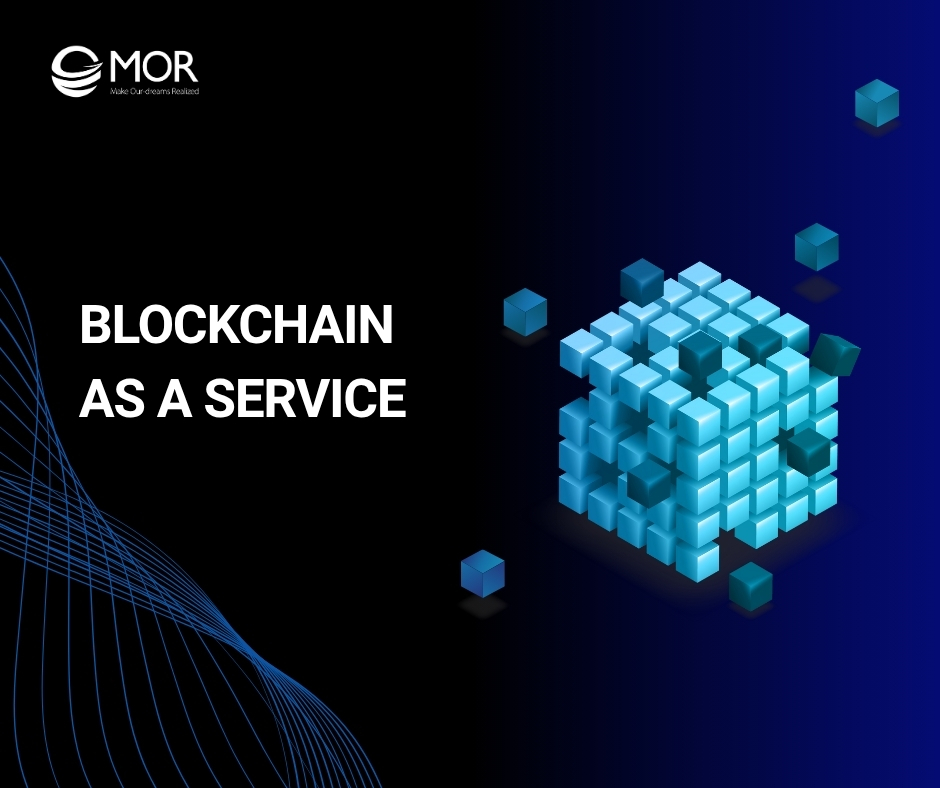
Businesses are looking for faster, safer, and more affordable ways to adopt blockchain without the heavy technical setup. That’s where blockchain as a service (BaaS) comes in, allowing companies to build and scale blockchain networks effortlessly through managed cloud platforms. In this guide, MOR Software explores how blockchain as a service providers are transforming businesses and making blockchain adoption smarter.
What Is Blockchain As A Service (BaaS)?
Blockchain as a Service (BaaS) refers to a managed cloud solution where third-party providers build, host, and maintain blockchain networks for organizations that want to develop or deploy decentralized applications. Instead of handling setup, security, and infrastructure on their own, businesses rely on these managed blockchain IT solutions to speed up innovation and lower costs.
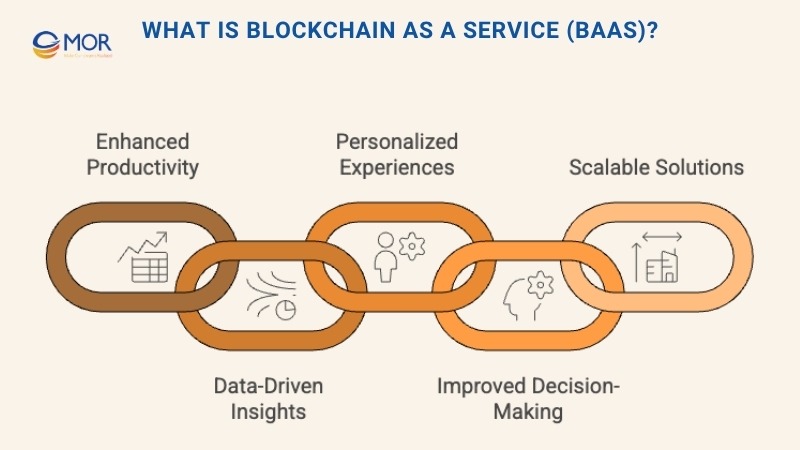
The Blockchain-as-a-Service market is growing steadily, with its value expected to reach around USD 1.76 billion in 2025 and rise to nearly USD 3.95 billion by 2030. This growth reflects how more companies are turning to managed blockchain solutions to meet their digital needs.
This concept has evolved from early cryptocurrency systems into enterprise-ready platforms supporting data security, asset tracking, and digital transactions. It gives organizations access to the same distributed ledger power found in bitcoin technology, but without the complexity of maintaining their own network. Industry reports show that global spending on blockchain solutions is expected to reach about USD 19 billion in 2024. This shows how businesses across many sectors are investing more in real-world blockchain projects.
Through BaaS, companies can experiment with blockchain models safely, scale quickly, and integrate them into existing systems. It’s now a cornerstone of enterprise modernization, bridging the gap between blockchain potential and real-world business use.
How Does Blockchain As A Service Model Work?
Below is a graphic showing how Blockchain as a Service (BaaS) operates through Hyperledger Cello, an open-source module toolkit that offers a visual dashboard for deploying, managing, and maintaining blockchain networks efficiently.
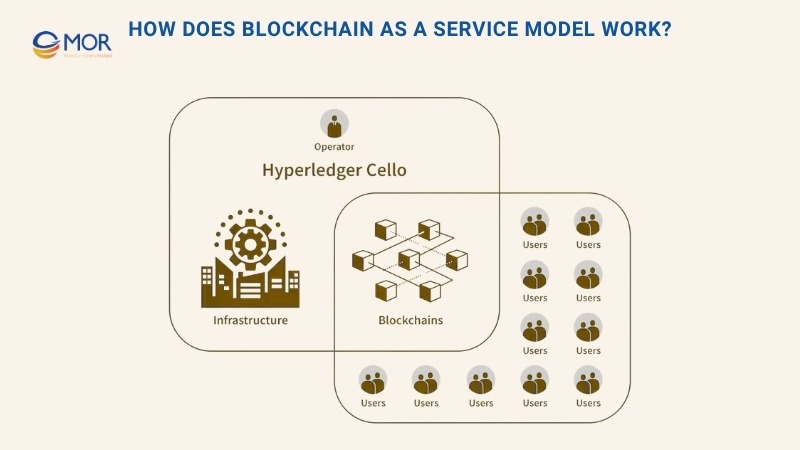
This model functions much like traditional cloud hosting. A third-party provider handles the backend infrastructure, allowing businesses to focus on building applications instead of managing servers or nodes. This managed setup simplifies deployment, scaling, and security while keeping costs predictable and performance consistent.
At its core, blockchain infrastructure as a service delivers the foundation needed to run decentralized applications. Providers set up the framework, monitor the network, and ensure data integrity through encrypted ledgers. This model mirrors how web hosting works: just as companies rely on cloud services for websites, they now depend on blockchain services industry experts for their distributed systems.
Large enterprises and startups alike often use AWS Blockchain as a Service, Microsoft Azure, or other cloud vendors to launch and maintain blockchain projects. Amazon Managed Blockchain, for instance, allows each account to operate as many as 50 Ethereum nodes in one region, showing how scalable and ready-to-use these managed blockchain platforms have become.
When outsourcing this complex infrastructure, organizations can focus on innovation, streamline operations, and drive adoption of secure, transparent digital ecosystems powered by BaaS.
What Are The Benefits Of Blockchain As A Service?
Switching from a traditional system to blockchain-based operations demands both high costs and technical expertise. Many companies hesitate to build and manage their own blockchain infrastructure for this reason. Blockchain as a Service (BaaS) changes that, providing a managed environment that simplifies blockchain adoption and reduces upfront investment. A blockchain as a service platform makes the shift smoother, more secure, and far more practical for modern enterprises.
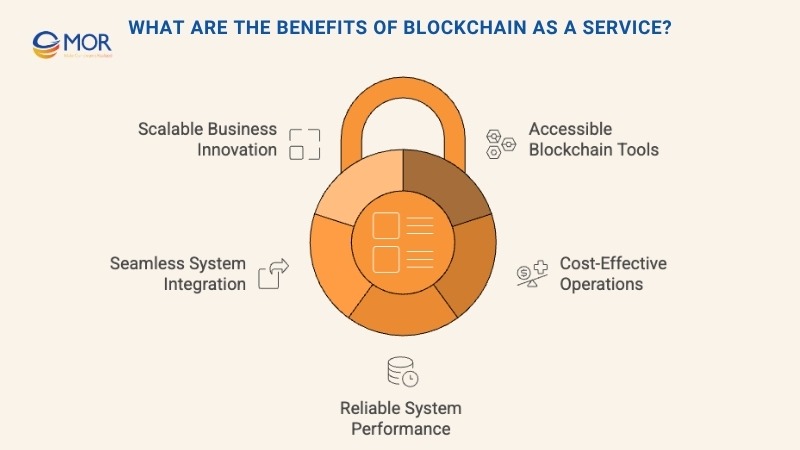
- Accessibility: BaaS providers act as blockchain infrastructure providers, giving every business access to advanced blockchain tools without needing to create or maintain their own network. This approach breaks down the technical barriers, allowing organizations of any size to experiment with decentralized systems and innovate faster. By offering pre-built environments, providers ensure companies can launch blockchain projects quickly and confidently.
- Cost-Effectiveness: Developing a blockchain in-house involves setup, maintenance, and hiring skilled engineers. With BaaS, these burdens disappear. Businesses plug into existing ecosystems and pay only for what they use through flexible subscription or usage-based pricing models. This helps them avoid the expense of building proprietary systems from scratch. Over time, the cost savings from outsourcing infrastructure, security, and updates can be substantial, freeing up capital for core growth areas. For instance, Azure Confidential Ledger offers a standard instance priced at about USD 0.124 per hour plus storage. This clear pricing structure makes it easier for finance teams to plan expenses and predict costs before expanding their blockchain operations.
- Reliability: Managing a live blockchain network requires constant monitoring, security upgrades, and data backup. Most organizations lack the bandwidth for that. BaaS providers take care of uptime, resource allocation, and security management. They implement encryption protocols and hardware security modules (HSMs) to safeguard transactions and digital assets. Privacy protection is also built into these managed systems, making them highly reliable for sectors like finance, logistics, and healthcare that depend on data confidentiality and uninterrupted service.
- Integration And Cross-Chain Compatibility: One of the greatest advantages of BaaS lies in its ability to integrate seamlessly with legacy systems. Managed providers build solutions that support cross-chain communication and compatibility across various ecosystems. This allows enterprises to connect blockchain with existing business software, synchronize data, and expand operations without technical friction. By combining scalability with interoperability, blockchain as a service supports long-term innovation across industries, from global supply chains to enterprise resource management.
In short, adopting this managed blockchain model gives companies a clear path to innovation without needing to handle the complexities of infrastructure. It brings blockchain closer to mainstream use while empowering businesses to focus on what they do best.
Real-World Applications Of Blockchain As A Service
Blockchain as a Service (BaaS) has found use across multiple industries, especially for businesses that already outsource technical work and prefer not to manage complex blockchain infrastructure. With managed deployment, monitoring, and scaling handled by providers, organizations can focus on business outcomes instead of technical challenges. The following blockchain as a service examples show how different sectors are applying this model effectively.
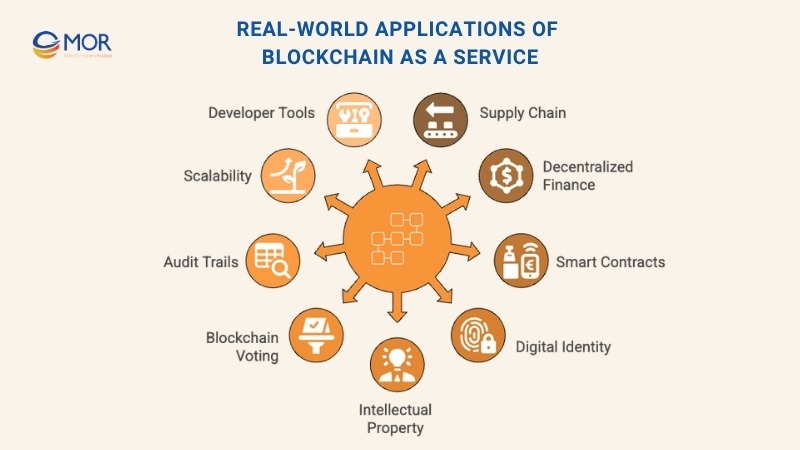
Supply Chain And Logistics
BaaS helps companies achieve full transparency in their logistics operations. Blockchain as a service companies use track-and-trace solutions to record every step of product movement, from manufacturing to final delivery, on a tamper-proof ledger. This creates a single, verified source of truth accessible to all supply chain participants.
Industries like food, pharmaceuticals, and retail benefit from improved tracking accuracy and compliance with safety regulations. With blockchain’s transparency, consumers gain confidence in the authenticity and safety of the goods they purchase, while companies reduce fraud and streamline reporting.
Decentralized Finance (DeFi)
BaaS also accelerates innovation in finance through AWS Blockchain as a Service and other managed ecosystems that simplify decentralized app development. Financial institutions use this model to build secure systems for lending, trading, and asset management without relying on intermediaries.
By leveraging blockchain-based architectures rooted in bitcoin technology, DeFi platforms powered by BaaS enable real-time, transparent transactions that reduce costs and enhance user trust. This managed approach lets banks, insurers, and fintech startups deliver safer, faster, and more inclusive digital financial services.
Smart Contract Automation
Blockchain as a Service (BaaS) makes it easier for organizations to develop and deploy smart contracts without managing complex infrastructure. These digital agreements execute automatically once predefined conditions are met, removing the need for intermediaries or legal oversight. With this managed blockchain model, businesses can run trusted transactions between anonymous parties securely and transparently.
Through automated workflows, BaaS enables use cases like shipment verification, instant payments, and digital asset transfers. Companies in logistics and trade benefit from fewer manual steps, lower administrative costs, and higher transaction accuracy. Governments can also use smart contracts for recording and transferring land titles, minimizing fraud and improving public trust in recordkeeping systems.
Digital Identity And Data Security
BaaS strengthens data protection through tamper-proof distributed databases that safeguard personal information. These systems create verifiable digital identities that cannot be easily altered or forged. When built on blockchain as a service, identity frameworks gain consistent uptime, scalability, and compliance readiness.
The integration of smart contracts further enhances privacy by enforcing access permissions and validation rules automatically. Sectors like healthcare and finance can securely manage sensitive client data, supporting cross-organization collaboration without exposing information. This approach aligns with the growing demand for reliable, blockchain-based identity systems in modern enterprises.
Intellectual Property And Digital Assets
Blockchain as a Service (BaaS) allows organizations to build decentralized systems for managing intellectual property rights, including patents, copyrights, and trademarks. By registering ownership and licensing information on an immutable blockchain ledger, creators gain verifiable proof of authorship and control over how their assets are used. This simplifies the licensing process, prevents unauthorized duplication, and ensures creators receive fair compensation.
In creative industries such as gaming and entertainment, BaaS supports genuine digital ownership. Players can securely trade virtual assets, tokens, and collectibles backed by blockchain verification. This framework also drives innovation in NFTs and digital rights management, making it easier to track asset history and distribution. As more platforms adopt BaaS, businesses gain new ways to protect intellectual property and monetize content responsibly.
Blockchain Voting Systems
BaaS also enables the creation of secure, transparent, and efficient digital voting platforms. These systems record votes on distributed ledgers, ensuring they cannot be altered or deleted. This improves trust in electoral results while reducing administrative complexity.
Governments and private organizations use blockchain as a service to host reliable voting applications that guarantee voter anonymity, eliminate duplication, and provide real-time verification. The outcome is greater confidence in democratic processes, corporate governance, and stakeholder decision-making through technology designed for transparency and accountability.
Blockchain Audit Trails
Blockchain as a Service (BaaS) providers maintain detailed records of every blockchain event, creating a complete and tamper-proof audit trail. Each transaction is logged in order, allowing businesses to trace the full sequence of actions across the network. These detailed records make it easier to perform internal audits, meet regulatory requirements, and conduct forensic analysis when needed.
Transparency lies at the heart of blockchain. Every transaction stored on the public ledger includes key details such as sender, receiver, timestamp, and transaction value. With this managed blockchain platform, companies gain real-time visibility into all activities within their network, improving accountability and strengthening trust across stakeholders.
Scalability And Performance
As blockchain adoption grows, scalability becomes a top concern. BaaS providers deliver elastic infrastructure that adapts to spikes in user activity or transaction volume. This ensures consistent performance even as businesses expand their operations. By managing capacity and optimizing throughput, BaaS supports enterprises that require stability and speed under varying workloads.
Developer Tools And APIs
A modern blockchain as a service platform comes with ready-to-use toolkits, software development kits (SDKs), and blockchain APIs that simplify decentralized app creation. Developers can build and deploy smart contracts, issue tokens, and connect existing enterprise systems to blockchain networks without starting from scratch.
These tools accelerate project timelines and lower technical barriers, allowing businesses and blockchain as a service startups to innovate faster. With managed environments, built-in integrations, and secure data handling, BaaS transforms blockchain development into an accessible and scalable service model for teams of any size.
Leading Blockchain As A Service Providers
The blockchain as a service (BaaS) market is driven by major technology leaders offering secure, scalable, and ready-to-deploy platforms. Below are some of the top blockchain as a service providers helping businesses accelerate adoption and innovation worldwide.
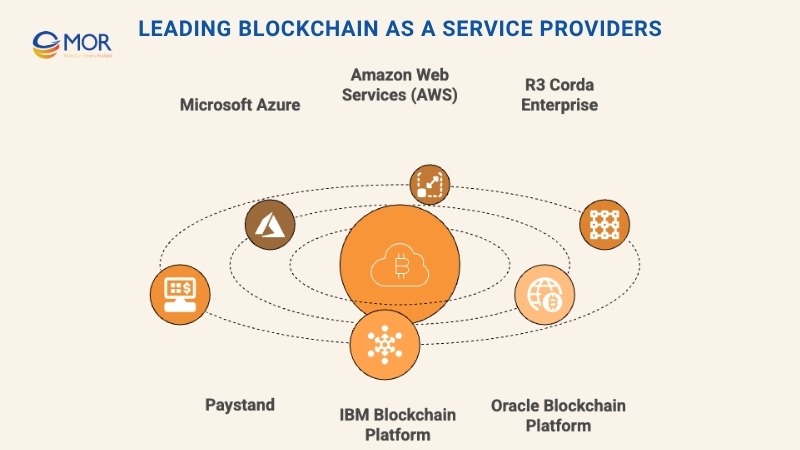
Microsoft Azure
Microsoft offers one of the most comprehensive blockchain as a service (BaaS) solutions through its Azure platform. The system enables developers to build, deploy, and manage blockchain applications with minimal setup time. Azure provides ready-made templates for popular frameworks like Ethereum and Hyperledger, along with seamless integration into tools such as Active Directory, Key Vault, and Logic Apps.
This blockchain as a service provider also supports multiple programming languages, making it flexible for teams across industries. Its enterprise-grade security, global infrastructure, and compatibility with existing Microsoft services allow businesses to experiment, scale, and commercialize blockchain applications quickly.
Amazon Web Services (AWS)
AWS Blockchain as a Service delivers purpose-built tools for every stage of blockchain adoption. Whether a company needs a centralized, cryptographically secure ledger or a multi-party network that eliminates intermediaries, AWS offers managed solutions designed for reliability and scalability.
As one of the best blockchain-as-a-service providers, AWS supports a significant portion of the global blockchain as a service market, hosting around a quarter of all Ethereum workloads worldwide. Major enterprise users of its Hyperledger Fabric services include BMW, Nestlé, Sony Music, DTCC, Workday, and Klarna Bank. Businesses trust AWS for its robust architecture, wide partner ecosystem, and proven expertise in blockchain innovation.
R3 Corda Enterprise
R3 introduced Corda Enterprise, a dedicated blockchain as a service (BaaS) solution designed for high-performance and regulated environments like finance, trade, and insurance. Built on the open-source Corda framework, the enterprise version adds advanced features for security, scalability, and network governance that meet strict compliance standards.
As one of the leading blockchain as a service providers, R3 delivers tools for identity management, audit logging, and real-time compliance monitoring. Its architecture ensures fast, reliable data exchange between organizations while maintaining privacy across transactions. This makes Corda Enterprise a trusted choice for industries that demand precision, confidentiality, and operational resilience.
Paystand
Paystand is a next-generation payment platform that leverages blockchain as a service to automate financial transactions for businesses. Founded in 2013, the company focuses on eliminating unnecessary transaction fees, digitizing cash flow, and creating a frictionless payment ecosystem.
Positioned among innovative blockchain as a service companies, Paystand operates on an Ethereum-based hybrid blockchain that powers secure, transparent B2B payments. Its network supports instant settlements and verifiable records, helping organizations move toward a “self-driving money” model where payments, reconciliations, and reporting happen automatically in real time.
IBM Blockchain Platform
IBM Blockchain Service empowers enterprises to build, deploy, and expand blockchain solutions that unlock new business opportunities. Through this blockchain as a service (BaaS) model, companies can either join existing blockchain networks already running on IBM’s infrastructure or co-develop a new ecosystem tailored to their needs.
The platform is built on Hyperledger Fabric, an open-source framework from the Linux Foundation. IBM provides enterprise-grade hosting, governance, and automation tools to help organizations bring blockchain projects to life faster. As one of the most trusted blockchain as a service providers, IBM offers proven scalability, compliance support, and a network of global partners across industries like finance, logistics, and manufacturing.
Oracle Blockchain Platform
Oracle Blockchain Platform delivers a comprehensive blockchain as a service platform designed to simplify development and integration. Also built on Hyperledger Fabric, Oracle’s solution includes peer nodes, a REST proxy, and a suite of operational tools to manage deployment and network performance.
The service comes with flexible pricing tiers, Standard and Enterprise, based on node usage and data storage requirements. Positioned among top enterprise-grade blockchain as a service companies, Oracle provides robust tools for automating workflows, securing transactions, and extending blockchain capabilities to existing Oracle Cloud systems, helping businesses achieve faster implementation and higher transparency in operations.
Common Challenges In Blockchain As A Service Adoption
The adoption of blockchain as a service (BaaS) offers significant benefits, yet implementing these solutions can bring several challenges for organizations. From technical complexity to internal resistance, businesses often face hurdles that require both strategic planning and skilled execution.
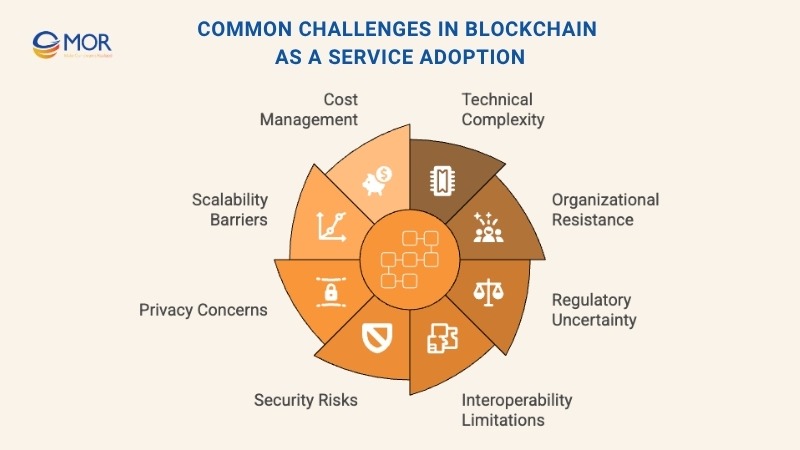
Technical Complexity
Despite growing maturity, blockchain remains a highly sophisticated technology. Designing, developing, and deploying distributed applications can take substantial time and expertise. Many teams still struggle to manage nodes, consensus mechanisms, and smart contract frameworks effectively.
Fortunately, major providers such as Azure and AWS Blockchain as a Service now supply ready-to-use templates and prebuilt frameworks that simplify this process. These managed tools lower the barrier to entry, helping developers experiment and scale faster. Still, mastering configuration, integration, and security settings demands ongoing learning within the blockchain services industry.
Organizational Resistance
Adopting blockchain often requires a cultural and operational shift. Internal politics, limited awareness, and outdated processes can delay transformation. Leadership teams must align on governance models and compliance standards to ensure smooth integration of BaaS systems.
Environmental concerns also shape decision-making. While proof-of-work systems consume large amounts of energy, newer consensus models like proof-of-stake are more sustainable. Businesses increasingly evaluate their providers’ carbon policies to match corporate sustainability goals. Partnering with responsible blockchain as a service providers helps organizations balance innovation with environmental responsibility.
Regulatory Uncertainty
Regulation remains one of the most significant hurdles in adopting BaaS. Since blockchain frameworks operate across borders, most jurisdictions still lack clear legal guidelines. This uncertainty makes it challenging for organizations to align blockchain projects with existing compliance rules or data protection laws.
The situation is gradually improving as governments and regulators start distinguishing blockchain from cryptocurrency. While both share similar origins, blockchain is a neutral technology focused on data transparency and trust. Companies using this service model must stay informed about evolving regional policies and design governance strategies tailored to each market.
Interoperability Limitations
Interoperability is another key obstacle for enterprises deploying blockchain systems. Different blockchains often rely on unique protocols, consensus algorithms, and architectures, making it difficult for networks to exchange data seamlessly. For organizations adopting blockchain as a service, this can limit collaboration and cross-chain operations.
Still, progress is being made. As blockchain as a service providers mature, more standardized APIs and integration tools are emerging to improve connectivity. Some businesses may not require full interoperability, but for those operating across ecosystems, the ability to synchronize data between blockchains will become a critical advantage in future deployments.
Security Risks
While blockchain as a service (BaaS) is widely recognized for its strong security model, it is not entirely immune to threats. Businesses must evaluate potential vulnerabilities before deploying blockchain solutions, especially when sensitive data and financial transactions are involved.
Blockchains are inherently resistant to brute-force attacks due to their cryptographic structure, but indirect risks like phishing, insider misuse, or social engineering can still compromise systems. For that reason, organizations using a managed blockchain platform should adopt strict cybersecurity standards, multi-layer authentication, and regular audits to safeguard networks. Just like with any cloud-based service, consistent monitoring and adherence to security best practices remain critical for long-term protection.
Privacy Concerns
Blockchain’s transparency, one of its strongest advantages, can also create privacy challenges. Public ledgers expose transaction data for verification, which may conflict with regulations or internal confidentiality policies. Companies handling personal or classified information must therefore decide what data belongs on the chain and what should remain private.
Modern blockchain as a service providers now address this issue through selective data visibility, permissioned access, and encryption. Platforms such as Corda Enterprise are designed to protect sensitive information while maintaining traceability. For businesses managing personal records or proprietary assets, balancing openness with privacy is key to using blockchain responsibly and effectively.
Scalability Barriers
One of the persistent issues in blockchain adoption is scalability. As transaction volumes and user activity increase, networks can experience slower processing times and higher resource consumption. For enterprises relying on blockchain as a service (BaaS), this can limit performance if not properly managed.
Fortunately, leading providers place scalability at the core of their infrastructure design. They use dynamic resource allocation, sharding, and optimized consensus mechanisms to handle growing demand efficiently. While not every project requires massive scale, BaaS platforms make it easier for businesses to expand or adjust capacity as market needs evolve, without overhauling their systems.
Cost Management
Implementing blockchain solutions can be expensive, particularly for organizations managing their own infrastructure. With blockchain as a service, these upfront costs are replaced by a flexible, pay-as-you-go model. Businesses only pay for the storage, processing, and transaction power they actually use, allowing for smarter budgeting and predictable expenses.
Most blockchain as a service companies also provide monitoring dashboards and automated alerts to help teams track spending in real time. This transparency enables better cost control while ensuring enterprises gain the full value of blockchain technology without unnecessary financial strain.
The Future Of Blockchain As A Service
The outlook for blockchain as a service (BaaS) is highly promising, with rapid expansion expected across both enterprise and startup ecosystems. Analysts forecast that the blockchain as a service market will reach around USD 11.5 billion by 2026, growing at a remarkable annual rate of more than 60%. This surge reflects increasing confidence in managed blockchain infrastructure as businesses recognize its role in reducing complexity, risk, and cost.
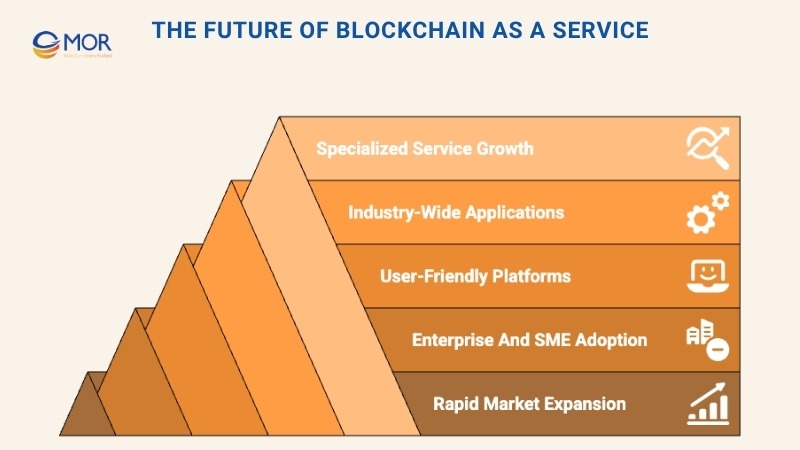
Much of this momentum comes from companies seeking to modernize their operations without building blockchain systems from scratch. While large corporations may continue to develop in-house networks, small and medium-sized enterprises are turning to trusted blockchain as a service providers to accelerate development and control expenses.
As tools become more user-friendly and blockchain IT solutions advance, adoption will move beyond finance and supply chain into fields like healthcare, real estate, and public administration. The rise of blockchain as a service startups will further drive innovation, offering specialized services tailored to industry needs. Together, these forces signal a future where blockchain becomes as accessible and routine as today’s cloud computing.
MOR Software’s Blockchain Solutions For Businesses
MOR Software helps companies turn blockchain technology into real business value. We design and deliver secure, practical, and scalable blockchain solutions that enhance trust, transparency, and operational efficiency across industries.
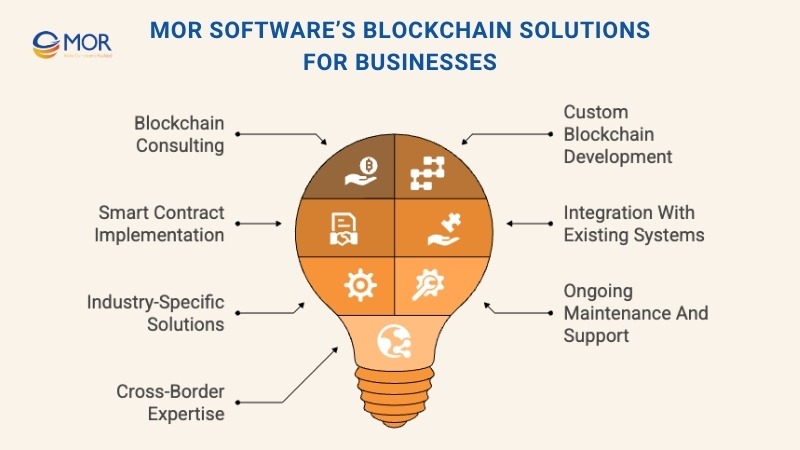
- Blockchain Consulting: We analyze your business goals to identify where blockchain fits best, from transaction tracking to digital identity or supply chain management.
- Custom Blockchain Development: Our engineers build tailored blockchain systems using leading frameworks such as Hyperledger Fabric, Ethereum, and Corda, ensuring high performance and data integrity.
- Smart Contract Implementation: We create smart contracts that automate transactions and enforce agreements without intermediaries, reducing costs and human error.
- Integration with Existing Systems: Our team connects blockchain platforms with existing ERP, CRM, or cloud systems, ensuring seamless data flow and minimal disruption.
- Industry-Specific Solutions: We develop blockchain applications for finance, healthcare, logistics, and manufacturing, adapting technology to each sector’s unique demands.
- Ongoing Maintenance and Support: MOR provides long-term monitoring, updates, and optimization to keep blockchain networks secure and scalable as your business grows.
- Cross-Border Expertise: With offices in Vietnam and Japan, we combine regional insight with international experience to deliver projects efficiently and cost-effectively.
Through these services, MOR Software empowers businesses to adopt blockchain confidently, transforming complex ideas into reliable systems that drive growth, innovation, and digital trust.
Conclusion
Blockchain as a Service (BaaS) is changing how businesses adopt blockchain by removing technical barriers and reducing costs. With managed platforms and expert support, organizations can focus on growth instead of infrastructure. As adoption accelerates, partnering with a trusted developer makes all the difference. MOR Software delivers secure, scalable blockchain solutions tailored to your goals. Ready to explore blockchain for your business? Contact us today to start building smarter solutions.
Rate this article
0
over 5.0 based on 0 reviews
Your rating on this news:
Name
*Email
*Write your comment
*Send your comment
1